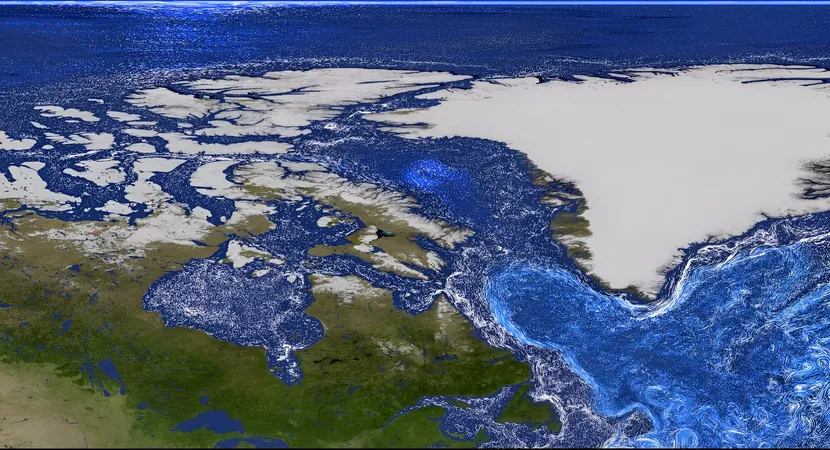
How Greenland’s Melting Ice Is Boosting Ocean Life
2025-08-08
Author: Wei
A Surprising Twist of Climate Change
While Greenland's colossal ice sheet melts, it does more than raise sea levels; it stirs up the ocean and nurtures life in unexpected ways. New groundbreaking research from scientists at San José State University, in collaboration with NASA and MIT, reveals that melting ice is invigorating the smallest organisms that form the foundation of the marine food chain.
The Ice Is Melting at Alarming Rates
Greenland's ice sheet, in some places over a mile thick, loses about 293 billion tons of ice annually. During summer, torrents of meltwater rush into the ocean—over 300,000 gallons per second gushing from the Jakobshavn Glacier alone. This fresh water doesn't vanish; instead, it creates nutrient-rich plumes that uplift vital resources from the depths of the ocean to the warmer, sunlit surface.
Phytoplankton: The Unsung Heroes of the Ocean
Phytoplankton are microscopic organisms, yet they are monumental in Earth's ecosystem, acting as the primary producers in oceanic food webs. They absorb large amounts of carbon dioxide, making them crucial for maintaining the planet's climate. Recent data from NASA indicates a 57% surge in phytoplankton growth in the Arctic from 1998 to 2018, which correlates intriguingly with glacial melt.
Unlocking Nature's Secrets with Cutting-Edge Technology
Oceanographer Dustin Carroll and his team tackled the challenge of understanding these remote systems buried beneath ice using an innovative tool called ECCO-Darwin—an advanced ocean simulation model developed at JPL and MIT. This virtual ocean lab combines decades of data to explore interactions of water, heat, salt, nutrients, and life across the planet.
Exciting Findings on Meltwater's Impact
Their intricate simulations revealed that glacial meltwater could amplify summer phytoplankton growth by an astounding 15 to 40% in the studied fjord. This increase hints at a complex link between melting ice and the health of marine ecosystems.
The Ripple Effects of Melting Ice
Though the ultimate implications for Greenland’s marine life remain uncertain, it’s evident that shifts in ice dynamics are reshaping marine environments. Carroll warns that as glacial melt intensifies, it will influence not only sea levels and land vegetation but also the salinity of coastal waters.
Carbon Absorption: A Double-Edged Sword
The research also examined how these changes might impact the ocean's capacity to absorb carbon dioxide. While meltwater makes surrounding seawater less capable of dissolving carbon, the burgeoning phytoplankton blooms offset this loss by consuming more carbon dioxide through photosynthesis.
A Versatile Tool for Broader Applications
Wood emphasizes that their modeling approach, likened to a Swiss Army knife, can be adapted to various scenarios beyond just Greenland, enabling researchers to explore ecological dynamics from the Gulf of Texas to the coasts of Alaska.
As our climate continues to shift, understanding these complex relationships will be key to predicting future ocean health and climate resilience.




 Brasil (PT)
Brasil (PT)
 Canada (EN)
Canada (EN)
 Chile (ES)
Chile (ES)
 Česko (CS)
Česko (CS)
 대한민국 (KO)
대한민국 (KO)
 España (ES)
España (ES)
 France (FR)
France (FR)
 Hong Kong (EN)
Hong Kong (EN)
 Italia (IT)
Italia (IT)
 日本 (JA)
日本 (JA)
 Magyarország (HU)
Magyarország (HU)
 Norge (NO)
Norge (NO)
 Polska (PL)
Polska (PL)
 Schweiz (DE)
Schweiz (DE)
 Singapore (EN)
Singapore (EN)
 Sverige (SV)
Sverige (SV)
 Suomi (FI)
Suomi (FI)
 Türkiye (TR)
Türkiye (TR)
 الإمارات العربية المتحدة (AR)
الإمارات العربية المتحدة (AR)